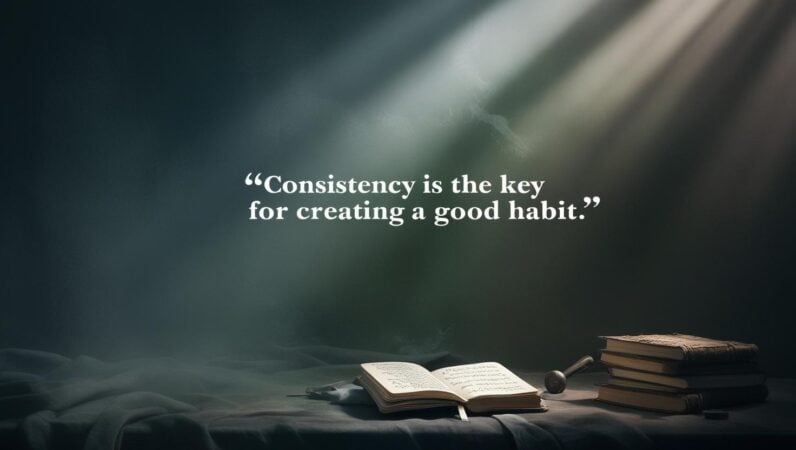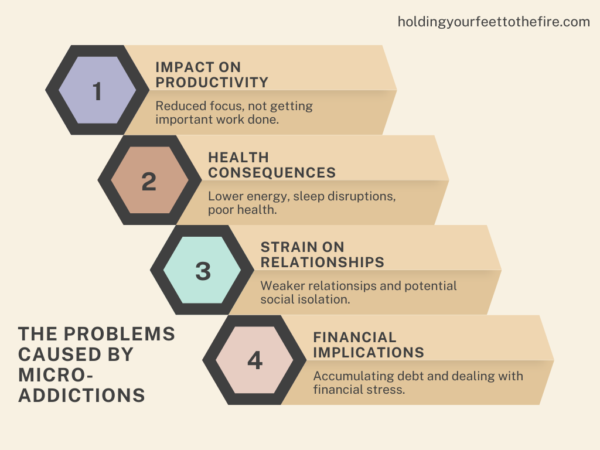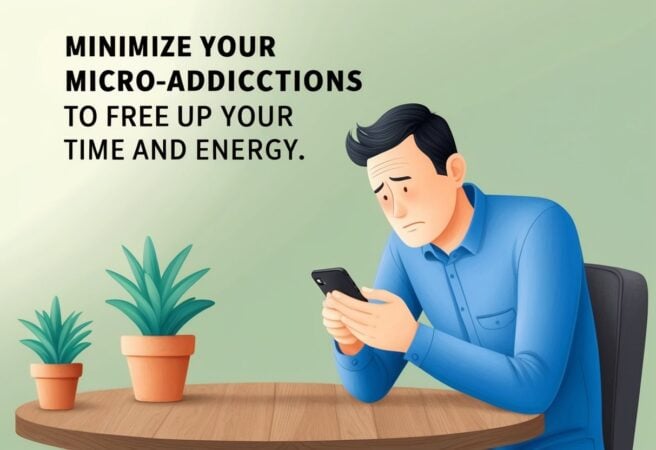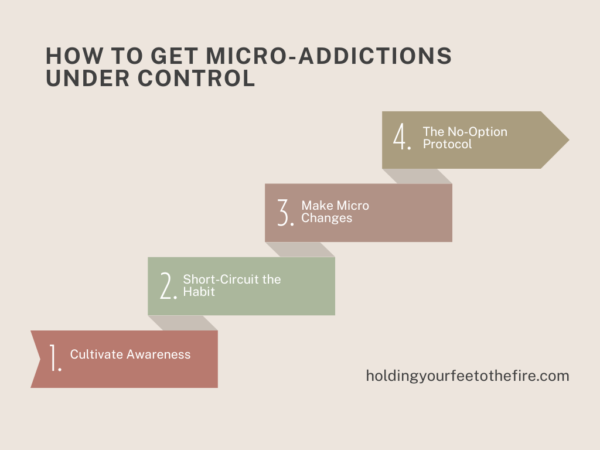You might not have any serious addictions in your life. You might not ever have had any serious addictions. But, like many of us, you might have some well-established micro-addictions.
What are micro-addictions?
These are small habits that don’t cause major disturbances in your life but they have a cumulative negative effect on you. They’re almost unnoticeable if you look at them on a short-term basis but over a few months or years, they can really cause issues for us.
Finally Finish What You Start
You don’t need more information. You need the accountability to execute.

If things aren’t working well for you in certain areas of your life, it might be due to several micro-additions.

What do micro-addictions look like?
Here’s an example of someone with several micro-addictions:
They’re trying to build an online business but they usually agree to meet up with friends or family for socializing during their workday. They have trouble saying “no” because social events are a relaxing distraction from working on their business. They are “addicted” to this pattern of behaviour. The payoff is the avoidance of work and the enjoyment of socializing.
That same person might have a goal to lose 10 pounds but they usually have a couple of beer after work and several times a day, they munch on some chips or snacks. Is this person an addict? Not in a major way, but they are somewhat addicted to those behaviours.
They may also be micro-addicted to certain emotions. We habitually emotionally react in predictable patterns. Someone cuts them off in traffic, they immediately get annoyed. Someone doesn’t reply to their email, they feel offended.
They receive positive news so they’re happy. The positive news later turns out to not be what they expected, so now they’re disappointed. Each external situation provokes an almost-automatic emotional response.
Micro-addictions are all the little behaviours that can be difficult for us to control. It’s hard to spot the damage they’re doing because the negative effects usually happen over a longer period of time.
The Problems Caused by Micro-Addictions
Micro-addictions might seem like no big deal at first, but over time, they can really mess with different parts of your life.
These tiny habits can sneak up on you, affecting your productivity, health, and even your relationships.
By getting a handle on how micro-addictions can cause issues, you’ll be in a better spot to tackle them head-on.

Impact on Productivity
Ever find yourself scrolling through social media when you should be working? Yep, that’s a micro-addiction at play.
These little distractions can totally throw off your focus and make it harder to get stuff done. Before you know it, you’re behind on your work or missing out on personal goals.
Health Consequences
Those small habits like snacking on junk food or skipping workouts might not seem like a big deal, but they can add up.
Over time, they can lead to weight gain and other health issues. Plus, if you’re constantly stressed out, it can take a toll on your mental health, ramping up anxiety and throwing you off-balance emotionally.
Strain on Relationships
Spending too much time on your phone or computer can put a real strain on your relationships. It’s easy to get caught up in the digital world and neglect the people who matter most.
This can lead to feelings of isolation or resentment, making it harder to connect with family and friends.
Financial Implications
Those little impulse buys or online purchases might not seem like much, but they can add up to a big financial headache.
Over time, these expenses can throw your budget out of whack and create stress you just don’t need.
By spotting how micro-addictions can cause trouble, you can start taking steps to keep them in check. Try setting some boundaries, practicing mindfulness, or reaching out for support.
These changes can help you tackle micro-addictions and lead a healthier, more balanced life.
The Role of Technology in Fueling Micro-Addictions
Technology is a double-edged sword. On one hand, it makes life easier and more efficient. On the other, it can lead to a myriad of micro-addictions that creep up on you.
Think about the last time you mindlessly scrolled through social media or couldn’t resist the ping of a new notification.
These small, seemingly harmless actions can add up, taking a toll on your time and focus.

The Social Media Trap
Social media platforms are designed to keep you engaged, and before you know it, you’ve spent hours scrolling through feeds.
This micro-addiction can disrupt your productivity and even your sleep patterns.
If you find yourself reaching for your phone first thing in the morning or before bed, it might be time to reassess how you engage with social media.
The Gaming Loop
Do you ever lose track of time while gaming?
Video games are crafted to be immersive and rewarding, which makes them highly addictive.
While a little gaming can be a great way to unwind, excessive play can lead to neglecting other important areas of your life, such as work, relationships, or self-care.
The Online Shopping Spiral
Ever clicked on an ad and ended up buying something you didn’t need?
Online shopping can be a quick fix for boredom or stress, but those impulse buys can quickly add up.
It’s important to be mindful of your spending habits and recognize when you’re shopping out of necessity versus compulsion.
Digital Detox Tips
To combat these tech-fueled micro-addictions, consider implementing a digital detox.
Start small by setting boundaries, like no screens during meals or an hour before bed. Use apps that track your screen time and set limits to help you stay accountable.
Remember, the goal isn’t to eliminate technology but to use it in a way that supports a balanced, healthy lifestyle.
By being aware of how technology can fuel micro-addictions, you can take proactive steps to regain control and ensure it serves you, not the other way around.
How to Get Micro-Addictions Under Control

Here are a few ideas to help you minimize or eliminate those pesky micro-addictions:
1. Practice awareness throughout the day
Observe your thoughts and emotions. Get to know how your mind works. Become more aware of how you’re feeling at various moments during the day. As you get better at being aware, you’ll develop the mind strength to control addictive and impulsive behaviour.
2. Catch yourself “in the act”.
“Oh, I was just about to dive in headfirst to that big bag of chips. I think I’ll hold off on that.”
Catch yourself in that moment where you’re about to act on a micro-addiction. Then, purposefully choose to do something else.
After all, you are in control, right?
3. Make micro-changes
Since we’re only dealing with minor but stubborn addictions, one helpful strategy is to make small adjustments. By making small habit changes, you’ll find it a lot easier to make changes, plus you’ll be able to keep your motivation up since you can still enjoy your micro-addiction but in a more moderate way and with more awareness.
4. Practice the “No-Option” protocol
If making micro-changes isn’t working well for you because you find it hard to practice moderation, then you might have to practice the mindset of “No Option”.
This is where you totally eliminate the option of your micro-addiction. You give yourself “no option” to indulge in it.
Sometimes it’s easier to go “No Option” than to practice moderating a negative habit.
“No-Option” can be done as a 15 or 30-day challenge where at the end of the time period, you can reassess if you want to continue. This makes it easier to commit since you’re only dealing with a short period of time and not “forever”.
Do you need to give up your micro-addictions?
Maybe…Maybe not. It all depends on how much they’re negatively impacting your life and how much stress or hassle they’re causing you.
If your micro-addictions are part of the reason why your business, health, or relationships are taking a hit, then cutting back on these habits could really pay off for you.
Taking a Closer Look
Take a moment to really think about how your micro-addictions are affecting you. Are they just a minor annoyance, or are they actually holding you back?
By figuring out their impact on different parts of your life, you can decide if it’s time to make a change. This can also help you figure out which ones need your attention right away and which can wait.
Cutting Back
Once you know which micro-addictions are causing the most trouble, it’s time to come up with a plan to cut back.
Set some realistic goals and break things down into small steps. You might want to get some support from friends or even a coach to help you stay on track.
It’s not about quitting everything at once but gradually getting a handle on things.
Finding Balance
As you work on dialing down your micro-addictions, focus on finding a balance.
Add some healthy habits into your routine, like regular exercise, eating right, and getting enough sleep. These positive changes can help balance out the negatives and lead to a more satisfying life.
By aiming for balance, you’ll be better prepared to tackle challenges and keep your habits in check.

Overcoming Micro-Addictions for Greater Success
Micro-addictions might seem small, but they can really interfere with your personal success if you’re not careful.
Recognizing how these little habits add up over time is key to breaking free and achieving your goals.
By understanding the role micro-addictions play in your life, you can take steps to tackle them and clear the path to success.
The Subtle Sabotage
These micro-addictions often fly under the radar, subtly influencing your daily decisions and actions.
Whether it’s the urge to check your phone during important meetings or putting off critical tasks, these behaviors can slowly chip away at your productivity and focus.
Over time, they might lead to missed opportunities and hold you back from reaching your personal and professional goals.
Spotting the Triggers
To get a handle on micro-addictions, it’s crucial to spot what sets them off. Are you grabbing your phone out of boredom or stress?
Do you find yourself munching mindlessly when you’re feeling anxious?
By figuring out the root causes, you can come up with strategies to tackle these triggers and cut down on micro-addictive behaviors.
Building Resilience
Building resilience is all about prioritizing long-term rewards over quick fixes. Set clear goals and keep your eyes on the prize to resist the pull of micro-addictions.
Practicing mindfulness and self-reflection can also help you stay grounded and aware of your actions. Remember, it’s about progress, not perfection.

Creating a Supportive Environment
Your surroundings play a big role in shaping your behaviors. To combat micro-addictions, set up a space that supports your goals and cuts down on distractions.
This might mean tidying up your workspace or setting tech boundaries to limit its influence on your daily routine.
Surround yourself with supportive people who encourage positive habits and hold you accountable.
Celebrating Small Wins
As you work to overcome micro-addictions, don’t forget to celebrate the small victories along the way.
Each step toward breaking a micro-addictive habit is a win for your commitment and progress. Acknowledge these achievements and use them as motivation to keep pushing forward.
By tackling the sneaky influence of micro-addictions, you can unlock your full potential and achieve greater success in all areas of your life.
Remember, it’s not about eliminating every micro-addiction overnight but making consistent, mindful choices that align with your long-term goals.
Until next time. : )
Nigel
PS: Want to reach your goals faster? Check out one of the online accountability coaching programs and book a complimentary Coaching Call.






